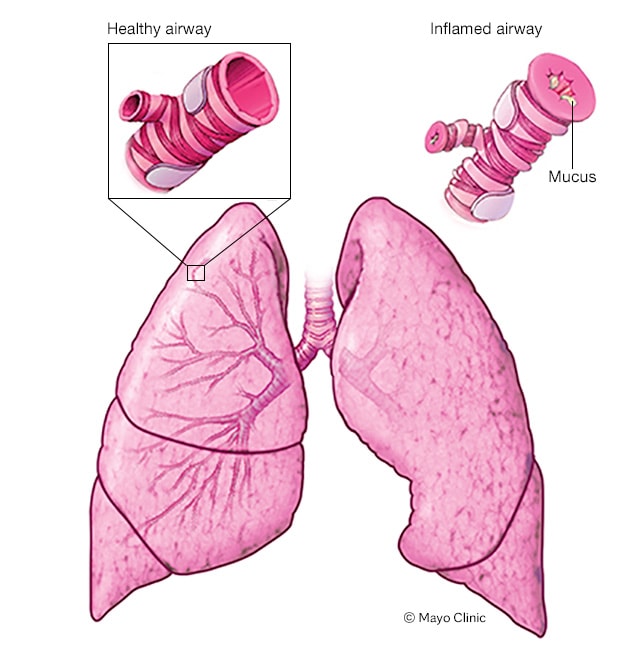Asthma is a medical condition that causes a person's respiratory tract (airways) to become inflamed, narrow, or swollen, thus making breathing difficult. Asthma can also cause the person's airways to produce extra mucus which also makes breathing difficult.
Asthma also makes the respiratory tract (trachea and bronchial tubes) to overreact to common things in the environment that one is exposed to on a daily basis.
Asthma can be minor or it can interfere with daily activities. In some cases, it may lead to a life-threatening attack.
Asthma may cause difficulty breathing, chest pain, cough and wheezing. The symptoms may sometimes flare up.
Asthma can usually be managed with rescue inhalers to treat symptoms and controller inhalers that prevent symptoms. Severe cases may require longer-acting inhalers that keep the airways open, as well as oral steroids.
It is quite common in Nigeria with an estimate of over 1.5 million cases a year, and it affects both children and adults. Asthma however, is a non-communicable disease (NCD).
Can Asthma damage the Lungs?
Asthma can cause irreversible damage to your lungs if the condition is not controlled well. Asthma inflames the inner lining of the respiratory tubes and tightens the smooth muscles surrounding the airways, resulting in narrowed airways and reduced air supply to the lungs.
Persistent inflammation in the bronchial passage can damage the mucus membrane in the airways and destroy their ability to filter air pollutants which can affect the lungs. Bronchial muscle spasms (bronchospasms) can narrow the airways, and progressively compromise lung function.
Persistent inflammation in the bronchial passage can damage the mucus membrane in the airways and destroy their ability to filter air pollutants which can affect the lungs. Bronchial muscle spasms (bronchospasms) can narrow the airways, and progressively compromise lung function.
Untreated asthma can get progressively worse, lead to long-term complications and cause avoidable damage to the respiratory system. Some types of childhood asthma do seem to improve on their own. Approximately 50% of children grow out of asthma, but it is impossible to predict who might outgrow and who might not, so it is best to treat asthma at the earliest signs.
Often asthma patients get used to mild breathing difficulties and excess mucus, treat only acute episodes and ignore the condition otherwise. Persistent asthma can worsen over time if not properly treated with maintenance medications, and affect overall health and quality of life.
Asthma is a chronic disease that flares up in acute episodes with triggers and stays dormant at other times. The absence of overt symptoms does not mean that the disease has gone away, and inflammation can persist causing lasting damage that is not immediately felt. Early and aggressive treatment may be the best solution to prevent irreversible damage to the lungs. Discuss with your doctor what you should do to give yourself early and aggressive treatments.
Often asthma patients get used to mild breathing difficulties and excess mucus, treat only acute episodes and ignore the condition otherwise. Persistent asthma can worsen over time if not properly treated with maintenance medications, and affect overall health and quality of life.
Asthma is a chronic disease that flares up in acute episodes with triggers and stays dormant at other times. The absence of overt symptoms does not mean that the disease has gone away, and inflammation can persist causing lasting damage that is not immediately felt. Early and aggressive treatment may be the best solution to prevent irreversible damage to the lungs. Discuss with your doctor what you should do to give yourself early and aggressive treatments.
How can you prevent permanent damage to the lungs from asthma?
You can protect your lungs from damage by controlling the disease well. Following are some steps you can follow to manage asthma and prevent lung damage.
- Try to identify and avoid your triggers for asthma attacks.
- Avoid all types of smoking (cigarettes, cigars, and vaping, for example) and second-hand smoke.
- Get flu and pneumonia vaccinations and protect against infections.
- Stay active and exercise.
- Follow your treatment plan diligently. Do not skip medications because you don’t have symptoms.
- Never stop or change your medication without checking with your doctor.
- Learn to identify early symptoms of an attack and treat yourself immediately.
- Have your lungs regularly checked by the doctor and learn to monitor your lung function with a home peak airflow meter.
- Seek medical help promptly if you are unable to keep the condition under control.




Comments
Post a Comment